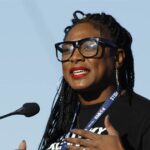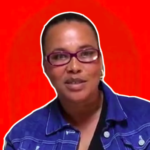Nearly 20 years ago, British poet, author and filmmaker, Malik Al Nasir was in the comfort of his home watching a TV documentary about the history of black footballers when a face jumped at him – it was a photograph of a black Victorian football star, Andrew Watson.
What startled Malik was that he and Andrew bore a close resemblance between them. Even his mother who was also watching the documentary in her house noticed the likeness.
In his spirit, Malik knew there was a relation, he and Andrew Watson had a familial connection. So, he sought to find out more.
Not a lot is known about Andrew Watson according to the documentary. His professional football life was clear but not his personal life, it was shrouded in mystery. Andrew Watson seemed to be a man of standing in the 19th century Victorian era. This was at a time where slavery was barely over in America.
This was a black man in Victorian England living the life of a gentleman performing with some of the biggest clubs in the world at that time.
His football career was well documented according to the documentary but there were other pieces of information that struck Malik.
‘The information about Andrew Watson was firstly the name, “Watson” which is my father’s name and my father’s name was Reginald Wilcox Watson and secondly the fact that I was born in Demerara (presently, Guyana) which is where his father comes from.”
That documentary started Malik on a journey that took him from Liverpool to Guyana in South America where he’d find out a lot more than he bargained for.
Back to 2002, starts Malik’s search for his family.
“At that time I knew very little about my father’s family. My father died when I was a teen and he’d been incapcitated in the hospital for many years and I had been in local authority care since the age of nine. He died when I was about 12 or 13. So, I never really had an opportunity to have a grown up conversation with my father. He used to say to me, ‘one day I’m going to take you back to the sugar cane farm’. So I knew that he cut sugar cane and knew that there was a history there of him being in Demerara which is the home of Demerara sugar. But what I did not know was if we had any living family or living relatives in Guyana and if so who they were.”
Demerara is in the north of Guyana and because of the sugar cane there were many plantations there during the colonial era. It was controlled first by the Dutch, then the British. Malik’s father had grown up there before moving to the UK.
He was a merchant seaman. “I had a seaman’s discharge book and I had within that details of my grandmother as living in Demerara and on his marriage certificate there was mention of his father, George Edward Watson and he was a schoolmaster. So there were some few snippets of information that were there for me but also very little.”
Malik Al Nasir was desperate to work out how they might be connected.
“So the reason I decided to create a family tree for Andrew Watson too was because the information that had been provided on the documentary was very comprehensive in terms of his footballing career but it was very sketchy in terms of his personal life and I felt deeply connected to this guy and I wanted to see how. So I actually created two family trees. I created one for myself, and one for Andrew Watson because I wanted to be sure I could map both of our families and then find the point of connection.”
Like Malik Al Nasir, Andrew Watson came from a mixed family.
“So Andrew Watson was the son of a black woman called Hannah Rose and a white Scottish sugar merchant called Peter Miller Watson. Peter Miller Watson was a slave trader.”
Realising there was only so much he could discover in his home in Liverpool, Malik decided to travel over 4,000 miles from the UK to Guyana to try to connect these two family trees and he had a very specific location in mind.
“My father’s friend had told me that my father had at one point lived in a village called Weldad.” When he got there, he met a man who was the point of call if you were looking for your family’s history.
He knew everybody in the area and all the families in the area but he didn’t know any Watsons. However, by chance the man went to a bank and overheard a woman mention the name, ‘Watson’ as her maiden name. It turns out she got in touch with Malik and the following day he drove to a village in Berbice to meet the woman.
“I came to the house and walked up the steps because the house was on stilts. As I got to the top I saw this little old lady smiling at me and her name was Witherlene and behind her was a photograph hanging on the wall. I just saw the photograph and I said that’s my dad and she said, that’s my dad. I thought, ‘oh my gosh, I’ve got an 80-year-old sister’ and I said ‘Reginald Watson’ and she said ‘yes’. Then I said, ‘Reginald Wilcox Watson and then she said no, that’s my uncle Reginald. This is Reginald Daniel William Watson, my father who is your uncle’. It then occurred to me that my grandfather had had two children by two different women; he’d called both of them Reginald and the only difference between them was their middle names. So she was in fact, my first cousin.”
To Malik, the discovery of his first cousin was incredibly moving for him. He says because at that point he felt like he now had family in Guyana.
“I had two things going on in my head at that point. It was who are they? How many are there? And you know, I need to meet everyone. That was my first thought. My second thought was is there any evidence as to the connection between them and Andrew Watson? For that purpose I started to look at the land.”
The land Malik talks of is an inheritance that was passed on to other family members of Malik’s but not his father. The land which was originally owned by Malik’s grandfather would have been distributed between his two sons; Reginald Wilcox Watson and Reginals Daniel William Watson. But his wife gave Malik’s father’s share to her son by another man.
“My father was essentially disinherited and he never went back to Guyana to claim his land.”
What raised Mailk’s eyebrow however, was the fact that it was unusual for a schoolmaster to own acres and acres of land passed down, and particularly plantation land. So he began to ask questions.
“At that point I was really thinking to myself what was a schoolmaster doing with so many acres of land? Because it wasn’t common for someone with a very simple profession to have so much land. So I was starting to think has this been passed down from slave traders? And if that’s the case was it any relationship to Andrew Watson and his father?”
His family and Andrew Watson’s family had the same surname and were both from Guyana. Andrew Watson’s dad, Peter Miller Watson had been in the sugar business in Demerara and Malik’s family had inherited land from the woodlands plantation in the same area. All Malik needed to do now was to prove that Peter Miller Watson had some connection to the woodlands plantation.
The final crucial piece of the puzzle came when Malik Al Nasir was back in Liverpool and browsing an internet auction site.
“Lo and behold there was this load of documents which was being sold together by stamp dealers in America who usually collect this with ephemera, which are letters in the pre-stamp era. I saw these letters and the description was about family names I recognized. So I just maxed out my credit card and bought the whole thing. It costs thousands of thousands of pounds.”
He bought these hoping they would unearth the connection between himself, his family living on the land in Guyana and Peter Miller Watson. “I was completely and utterly flabbergasted when I got the documents; to find that not only did they provide a comprehensive accounting of this entire mercantile operation that Peter Miller Watson was overseeing in Demerara but it was linked to a big mercantile operation in Liverpool but one of the plantations that appeared over and over again in the accounts was the Woodlands plantation. The very land that was inherited by my grandfather, passed on to my cousins and the land that they live on currently.”
It was the link he’d been trying to make ever since he watched the documentary about Andrew Watson back in 2002 and it soon all fell into place.
“So when I started to try and understand my relationship to Andrew Watson and his family I looked at the fact that Peter Miller Watson went to Guyana with two of his brothers. William Robertson Watson and Henry Robertson Watson. It was William to the best of my understanding who was a plantation overseer who actually managed the Woodlands plantation and when I spoke to my cousins they informed me that my great great grandmother married William Watson who was a white Scottish merchant.
I came to understand that it was William Robertson Watson who passed the land down. So I come from Andrew Watson’s uncle’s line and not his father’s line.”
But with that connection established came confirmation that Malik’s ancestors in Guyana weren’t just the people who’d worked on the plantation but the white plantation owners. “I think the realisation that I am a descendant of both slave owner and slave was an uncomfortable realisation. But one that I have come to terms with purely on the basis that it is the reality and the historical truth. I’m not one for manicuring history to give you the narrative that you want to hear.”
He also found out that one of the figures involved in the slave trade from his family line was also a powerful person in politics and banking in Liverpool. He found out he was related to the founder of the bank.
“To find out I had this relationship to all of these guys was quite revelatory to me because on the one hand, these people were slave traders and that bothered me and my black ancestors were slaves. On the other hand, I’m living in a city of which these people were largely the architects and I’m being told to go back to where I come from, from people who are racist.
The reality though is that I am related to both the slaves and the slave traders which means I have a familial relationship entirely to the architects of the city. Albeit it that they did so with the proceeds of slavery. So to be told by the rank and file, to go back to where I came from, seemed absurd and I felt it was necessary for me to bring that history back to them to show them actually I now know where I came from. This is where I came from.”
Malik Al Nasir is currently studying his doctorate at the University of Cambridge, researching the company his white ancestors ran and the role it played in the slave trade.














